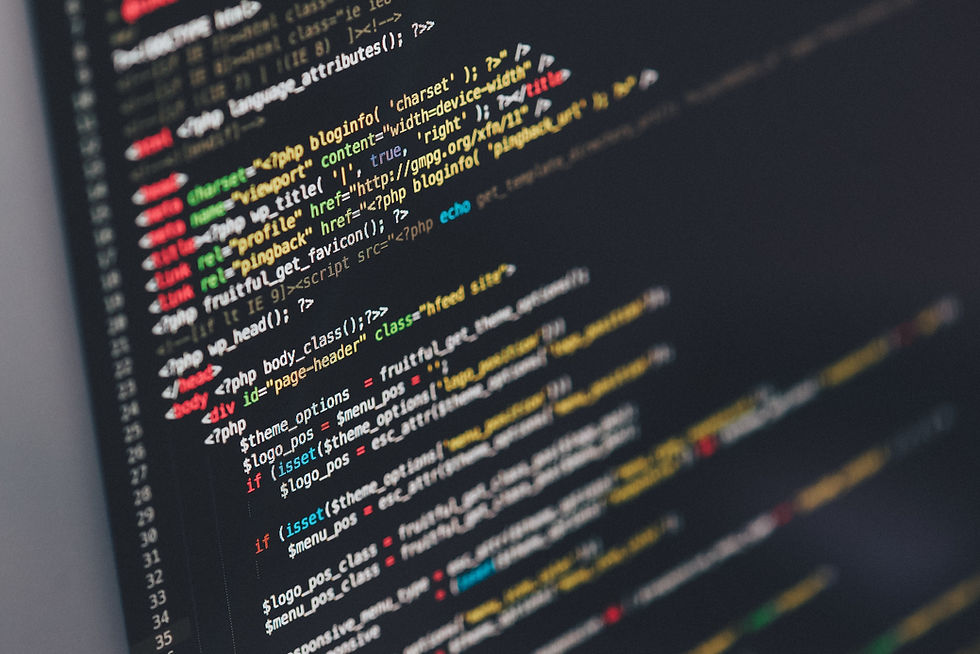Learn to Code
- James Brickner
- Sep 17, 2017
- 4 min read
High school students always ask me, “You studied STEM stuff right? What is the best advice you can give to someone who wants to go into one of those fields?”
My answer to this question just happens to include the same three answers I give to anyone looking for career advice, and the same recommendations I give to anyone who is in the process of changing professions mid-career – and I have given this advice to everyone from Communication majors to Physics-hopefuls, to Lawyers looking to cut their teeth in Business and IP-Law.
And what are these three, oh-so-valuable pieces of advice?
First, learn to code.

Second piece of advice is “learn to code.”
Oh yeah, and the third piece of critical advice (repeat with me out loud if you know the pattern here) is also learn to code!
My apologies if my delivery of this critical information came across as trite, but in my mind, learning to code, or less-colloquially, learning to program computers, is the single most important additional skill you can currently possess in today’s work place.
For students who are even considering going into a science, math, or engineering discipline, the ability to code is critical (read: having some level of programming familiarity is basically a requirement for these types of high-paying jobs these days).
WHISKEY BARREL RESTAURANT & BAR PRESENT OKTOBERFEST (Click for more details)
In a world where the workforce is becoming increasingly automated, and job replacement by machines and computers is a very real threat, coding is the one skill that could allow you to maintain usefulness when robots take all the entry-level and semi-skilled jobs, or if they manage to plunge humanity into a dystopian-Matrix like future.

And whether the future presents a world where humans lose out to computers and robots or it is simply a world where robots take our food orders and clean tables (and take all the entry-level jobs), people who know how to code will be able to eke out some sort of profession programming and reprogramming the robots and computers of the world.
The crux of the issue is that for the foreseeable future, programming is and will be the basis of a large part of the global and local economies; if you learn to code, your employment and income options can expand drastically, and job security, something so many still worry about, might be a bit better.
And although programming and software engineering are hot fields right now, and probably won’t be as popular ten or twenty years from now, it doesn’t mean that programming will go away. There has been a constant trend toward improving computer capabilities for the last twenty plus years.

It is quite doubtful that knowing how to program is going to be anything but a positive aspect of your resume, well into the future. In fact, it is most likely that given time, programming computers will become more a part of our lives, as high schools and universities attempt to align their curricula with the skills most valuable in the workplace.
Because programming involves using typed words to give computers and other devices instructions, it necessitates a strong knowledge of mathematics. Now this is not to say you need to be good at math to code, and in fact, the professional programmers I have known have actually been quite honestly dreadful at regular, everyday high-school style math. And these are people who programmed games for large, very well-known video game companies as well as those who work at a very large, very competitive computer companies.
But these individuals, who are exceptional coders, became good at math precisely because they learned to program. So hidden in this is another valuable point: learning to program improves your mind’s ability to think logically, because programming, by-and-large is an exercise in logical systems.

You may not become a great logistician or mathematical genius by learning to program a computer, but it will shape how you think through things in your daily life in a subtle, probably indistinguishable way. And honestly, the world could use a bit more logic these days.
Beyond the benefits of improved logic is the ability to keep your mind sharp, and maintain or improve the mathematical skills you already have. For retired persons, learning to program typically means classes, interactions with other students, and a chance to socialize while also maintaining mental acuity.
Plus nary a day or week or month passes that I don’t hear about some retired person improving their computer skills, learning a programming language like HTML or Javascript (not to be confused with Java) and starting some sort of online business. Or you can use it to customize your Facebook page. It all depends on your goals and dreams.
And therein lies the biggest value of programming: you don’t have to be a software engineer to start programming now. Enroll in a class at Delta or Pacific, or even learn for free online at a website like codeacademy.com or youtube.com. I myself have used the free eBook “Learn Python the Hard Way” in my adventures in coding.
Click on Youtube Video Above for Instruction
The bottom line is that the resources for learning to code are out there, and are quite often free. And once you get into it, coding really isn’t all that hard. And it has the potential of increasing your paycheck and you job opportunities if you practice enough.







Comments